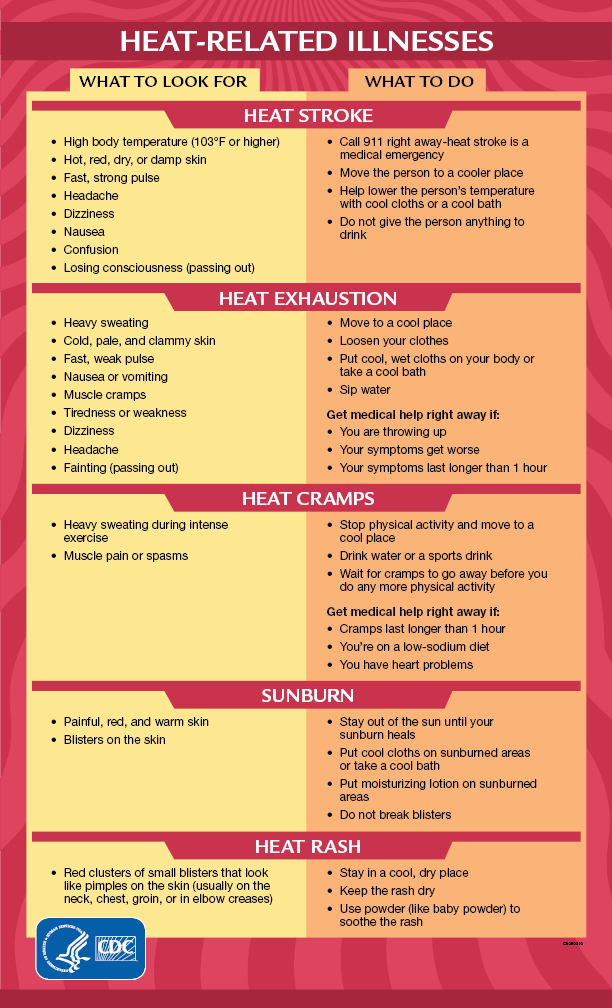The massive heat wave already affecting much of the country is on the horizon for Southern Maryland and with it comes at least a week of high humidity and temperatures well into the 90s.
You already know about how to prevent skin cancer by practicing sun-safety, but during a heat wave, you’ll need to be extra careful to protect yourself against heat-related illnesses. It might seem straightforward enough, but the Centers of Disease Control and Prevention (CDC) estimates that more than 600 people in the U.S. die every year due to extreme heat. Because of that, we’re highlighting some helpful tips to keep you and your family safe during the heat wave — and throughout the summer.
Stay in the AC if You Can
The easiest, most effective way to avoid a heat-related illness is to stay inside in the air conditioning. We know it’s hard to avoid a sunny day, especially because of how this year has gone, but even just a few hours in the AC can help your body stay cooler if you head outside later.
If you do decide to go outside, try to remember some of the following tips:
- Drink more water than usual before, during, and after your activity
- Wear loose, lightweight, and light-colored clothing
- Pace yourself if you’re going to be active
- Choose times to go outside that are likely to be less hot and humid — avoid going out in the middle of the day if you can
- Don’t forget sunscreen!
Drink Plenty of the Right Fluids to Stay Hydrated
We say “the right fluids” because too many people confuse sugary and/or alcoholic beverages with fluids that actually help keep you hydrated in the heat.
As refreshing as a cold beer, soda, or frozen drink might sound on a hot day, water is the best source of hydration. If you’re doing something active outside and need more than water to replace the minerals and electrolytes lost by sweating, you can definitely consider sports drinks, but be sure to balance your intake with water if you choose something that’s high in sugar.
Know the Risk Factors for Heat-Related Illnesses
Some people are more vulnerable to extreme temperatures due to a medical condition, their age, their occupation, their living situation, or their activity level. For example, people whose jobs require them to work outside are more likely to become dehydrated and suffer from heat-related illnesses.
Many people who have chronic medical conditions, such as heart disease, mental illness, or obesity, or who are over the age of 65 have a more difficult time staying cool or responding to heat. In addition, some low-income households can face additional stress during heat waves due to the lack of air conditioning or poorly ventilated homes.
Know How to Spot the Warning Signs of Heat Stroke, Heat Exhaustion, and Dehydration
There are a few heat-related illnesses to be aware of, but heat stroke is the most dangerous to a person’s immediate health and well-being. Some of the most common symptoms of heat stroke include:
- A body temperature above 103° F
- Confusion, slurred speech, delirium, passing out, etc.
- Skin feeling hot and dry to the touch, and it may look flush (turn red)
- Nausea and vomiting
- Throbbing headache
- Rapid heart rate and/or breathing
Check out this graphic from the CDC for more information about symptoms of the main heat-related illnesses and what you should do if you spot them (click here for the full-size image):
Keep an Eye Out for Each Other
If you have a friend, family member, or neighbor who might be vulnerable to the heat, be sure to reach out every now and then to make sure they’re OK. A quick conversation could save someone’s life!
We know it’s important to maintain social distancing right now, so a phone or video call is usually all it takes. But if you don’t know the person well enough to do that, just wear a mask when heading over to their home to check on them.
If you or someone you know is showing signs of heat stroke, call 911 right away. Stay safe out there, Southern Maryland!


